Evaluation of Reasoning and Argument: Article Analysis Assignment
VerifiedAdded on 2023/03/29
|6
|1305
|233
Homework Assignment
AI Summary
This assignment analyzes an argument concerning the Australia Day holiday. The student evaluates the article's reasoning, rhetoric, and overall strength. The analysis focuses on the use of ethos, pathos, and logos in the article, and the student identifies which of the arguments are strong or weak. The student also assesses the author's use of language and how it contributes to the persuasion of the argument. The assignment explores the historical context of Australia Day and the diverse perspectives on its celebration, highlighting key factors such as the British settlement and its impact on different communities. The student also considers the significance of historical awareness and the role of government in educating the public about national holidays. Finally, the document references several academic sources, including journal articles and books, to support the analysis and provide a comprehensive understanding of the topic.
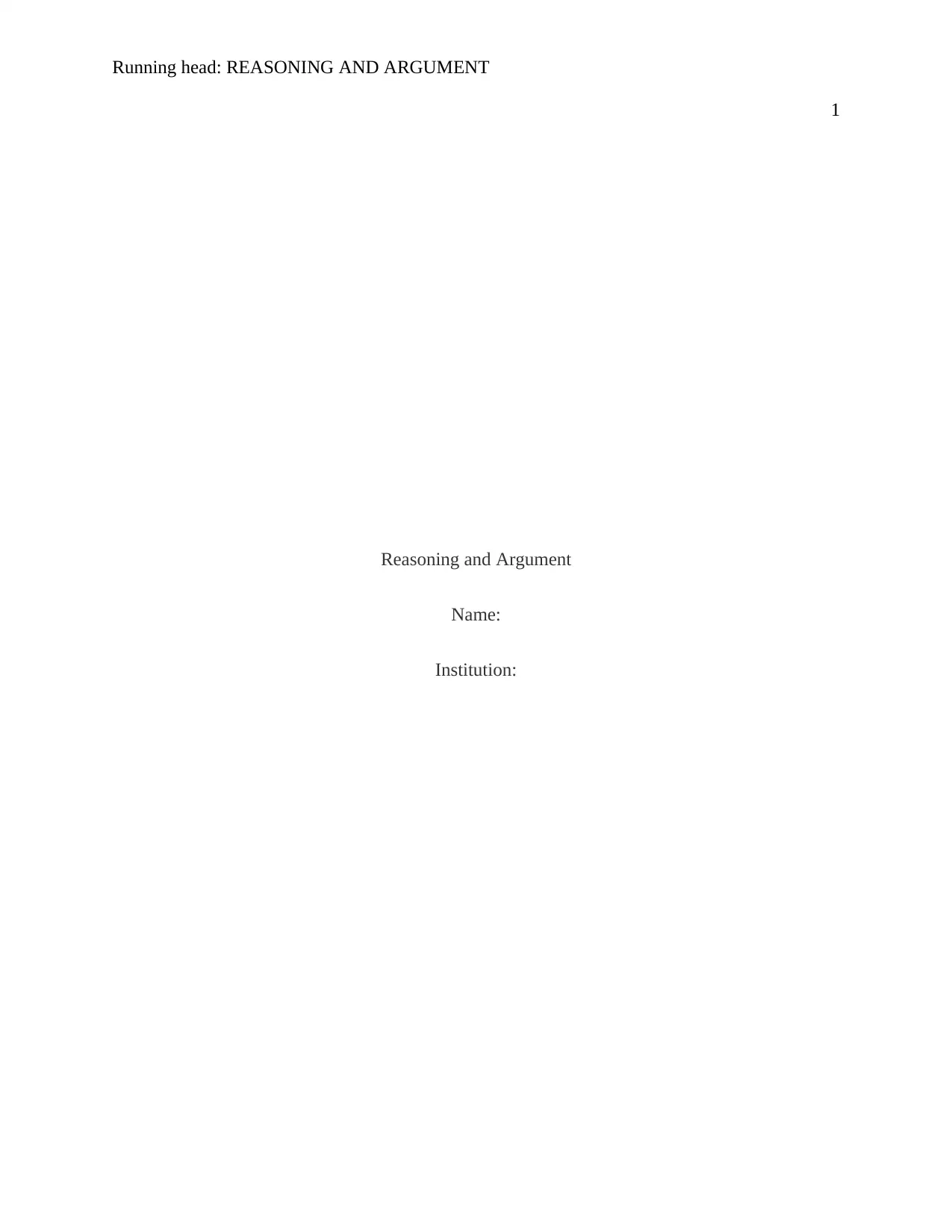
Running head: REASONING AND ARGUMENT
1
Reasoning and Argument
Name:
Institution:
1
Reasoning and Argument
Name:
Institution:
Paraphrase This Document
Need a fresh take? Get an instant paraphrase of this document with our AI Paraphraser
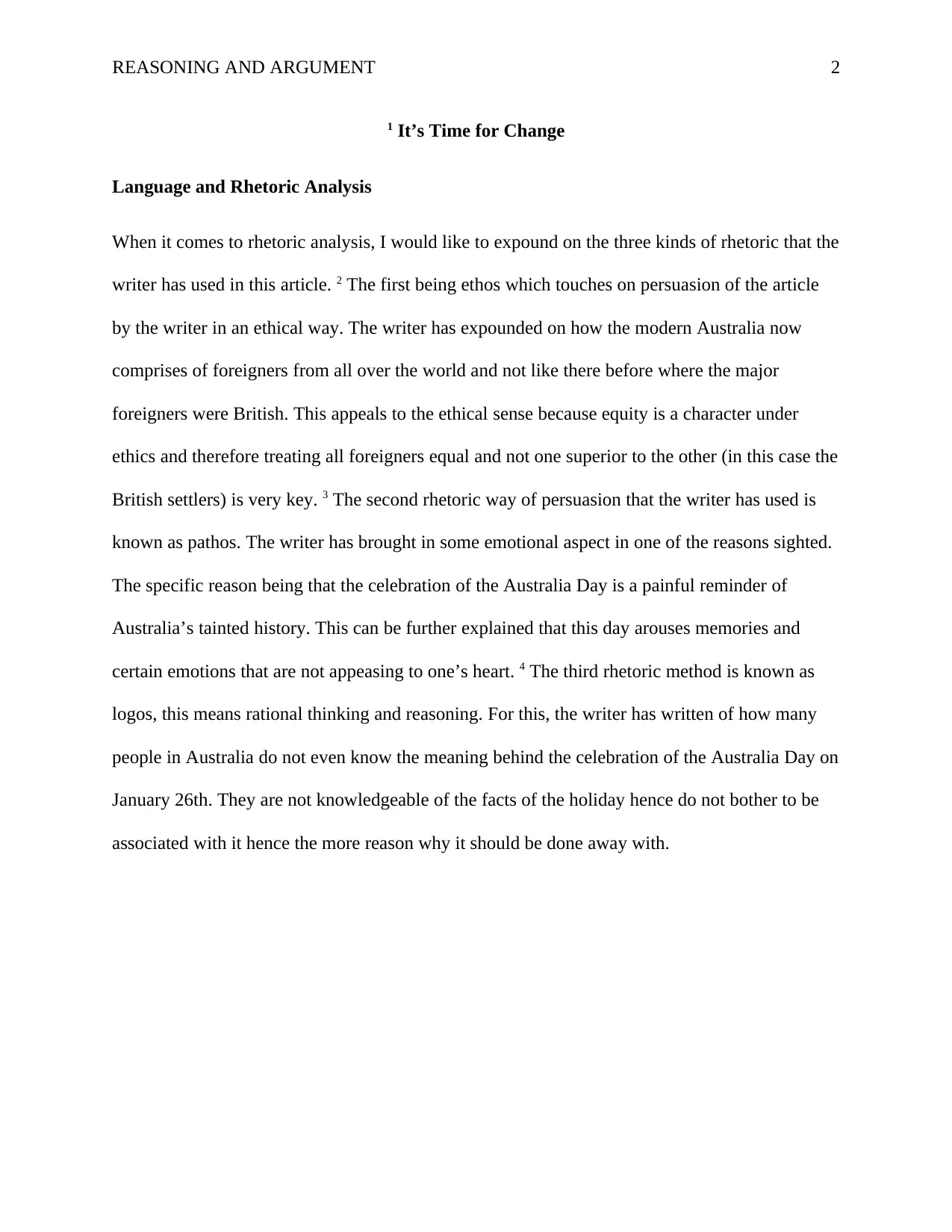
REASONING AND ARGUMENT 2
1 It’s Time for Change
Language and Rhetoric Analysis
When it comes to rhetoric analysis, I would like to expound on the three kinds of rhetoric that the
writer has used in this article. 2 The first being ethos which touches on persuasion of the article
by the writer in an ethical way. The writer has expounded on how the modern Australia now
comprises of foreigners from all over the world and not like there before where the major
foreigners were British. This appeals to the ethical sense because equity is a character under
ethics and therefore treating all foreigners equal and not one superior to the other (in this case the
British settlers) is very key. 3 The second rhetoric way of persuasion that the writer has used is
known as pathos. The writer has brought in some emotional aspect in one of the reasons sighted.
The specific reason being that the celebration of the Australia Day is a painful reminder of
Australia’s tainted history. This can be further explained that this day arouses memories and
certain emotions that are not appeasing to one’s heart. 4 The third rhetoric method is known as
logos, this means rational thinking and reasoning. For this, the writer has written of how many
people in Australia do not even know the meaning behind the celebration of the Australia Day on
January 26th. They are not knowledgeable of the facts of the holiday hence do not bother to be
associated with it hence the more reason why it should be done away with.
1 It’s Time for Change
Language and Rhetoric Analysis
When it comes to rhetoric analysis, I would like to expound on the three kinds of rhetoric that the
writer has used in this article. 2 The first being ethos which touches on persuasion of the article
by the writer in an ethical way. The writer has expounded on how the modern Australia now
comprises of foreigners from all over the world and not like there before where the major
foreigners were British. This appeals to the ethical sense because equity is a character under
ethics and therefore treating all foreigners equal and not one superior to the other (in this case the
British settlers) is very key. 3 The second rhetoric way of persuasion that the writer has used is
known as pathos. The writer has brought in some emotional aspect in one of the reasons sighted.
The specific reason being that the celebration of the Australia Day is a painful reminder of
Australia’s tainted history. This can be further explained that this day arouses memories and
certain emotions that are not appeasing to one’s heart. 4 The third rhetoric method is known as
logos, this means rational thinking and reasoning. For this, the writer has written of how many
people in Australia do not even know the meaning behind the celebration of the Australia Day on
January 26th. They are not knowledgeable of the facts of the holiday hence do not bother to be
associated with it hence the more reason why it should be done away with.
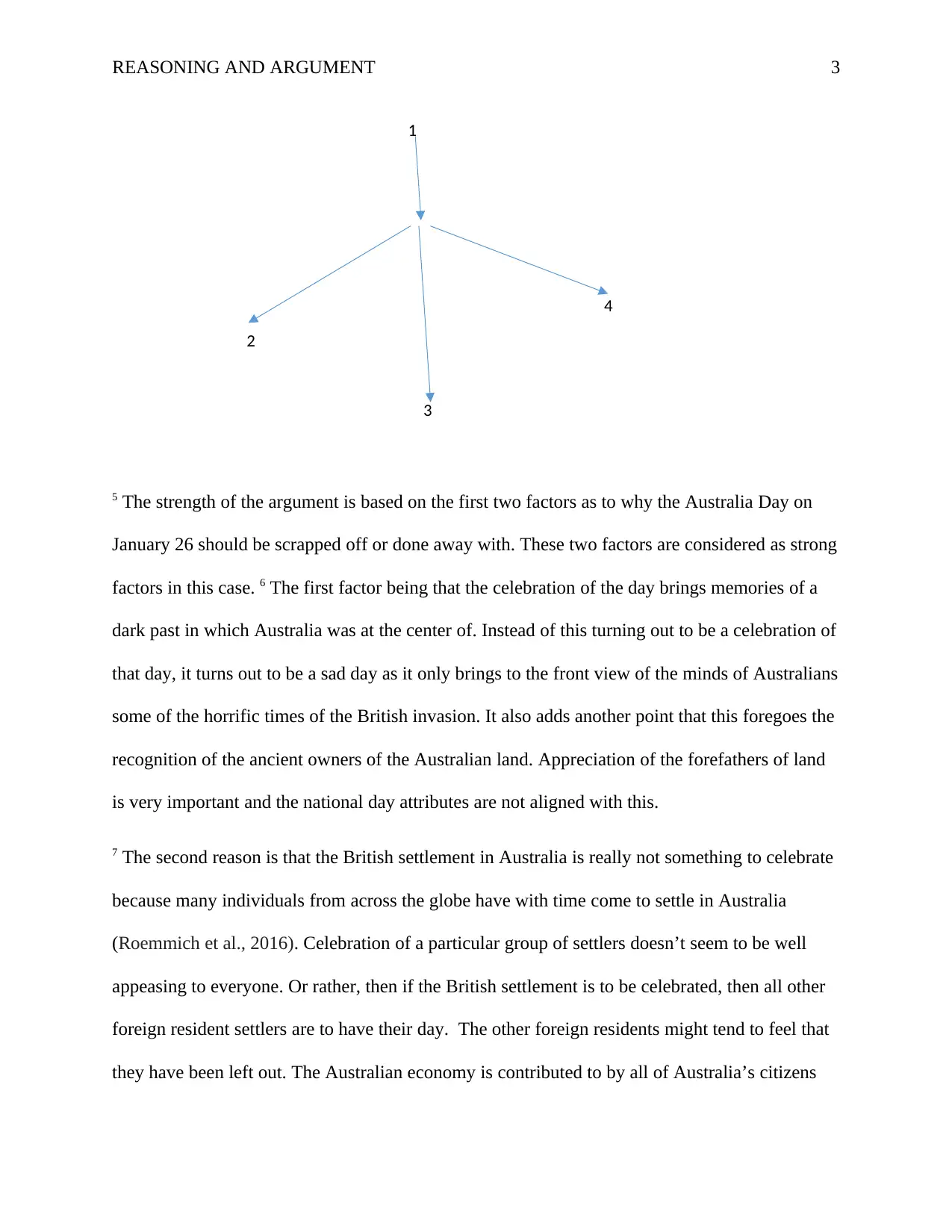
REASONING AND ARGUMENT 3
1
4
2
3
5 The strength of the argument is based on the first two factors as to why the Australia Day on
January 26 should be scrapped off or done away with. These two factors are considered as strong
factors in this case. 6 The first factor being that the celebration of the day brings memories of a
dark past in which Australia was at the center of. Instead of this turning out to be a celebration of
that day, it turns out to be a sad day as it only brings to the front view of the minds of Australians
some of the horrific times of the British invasion. It also adds another point that this foregoes the
recognition of the ancient owners of the Australian land. Appreciation of the forefathers of land
is very important and the national day attributes are not aligned with this.
7 The second reason is that the British settlement in Australia is really not something to celebrate
because many individuals from across the globe have with time come to settle in Australia
(Roemmich et al., 2016). Celebration of a particular group of settlers doesn’t seem to be well
appeasing to everyone. Or rather, then if the British settlement is to be celebrated, then all other
foreign resident settlers are to have their day. The other foreign residents might tend to feel that
they have been left out. The Australian economy is contributed to by all of Australia’s citizens
1
4
2
3
5 The strength of the argument is based on the first two factors as to why the Australia Day on
January 26 should be scrapped off or done away with. These two factors are considered as strong
factors in this case. 6 The first factor being that the celebration of the day brings memories of a
dark past in which Australia was at the center of. Instead of this turning out to be a celebration of
that day, it turns out to be a sad day as it only brings to the front view of the minds of Australians
some of the horrific times of the British invasion. It also adds another point that this foregoes the
recognition of the ancient owners of the Australian land. Appreciation of the forefathers of land
is very important and the national day attributes are not aligned with this.
7 The second reason is that the British settlement in Australia is really not something to celebrate
because many individuals from across the globe have with time come to settle in Australia
(Roemmich et al., 2016). Celebration of a particular group of settlers doesn’t seem to be well
appeasing to everyone. Or rather, then if the British settlement is to be celebrated, then all other
foreign resident settlers are to have their day. The other foreign residents might tend to feel that
they have been left out. The Australian economy is contributed to by all of Australia’s citizens
⊘ This is a preview!⊘
Do you want full access?
Subscribe today to unlock all pages.

Trusted by 1+ million students worldwide
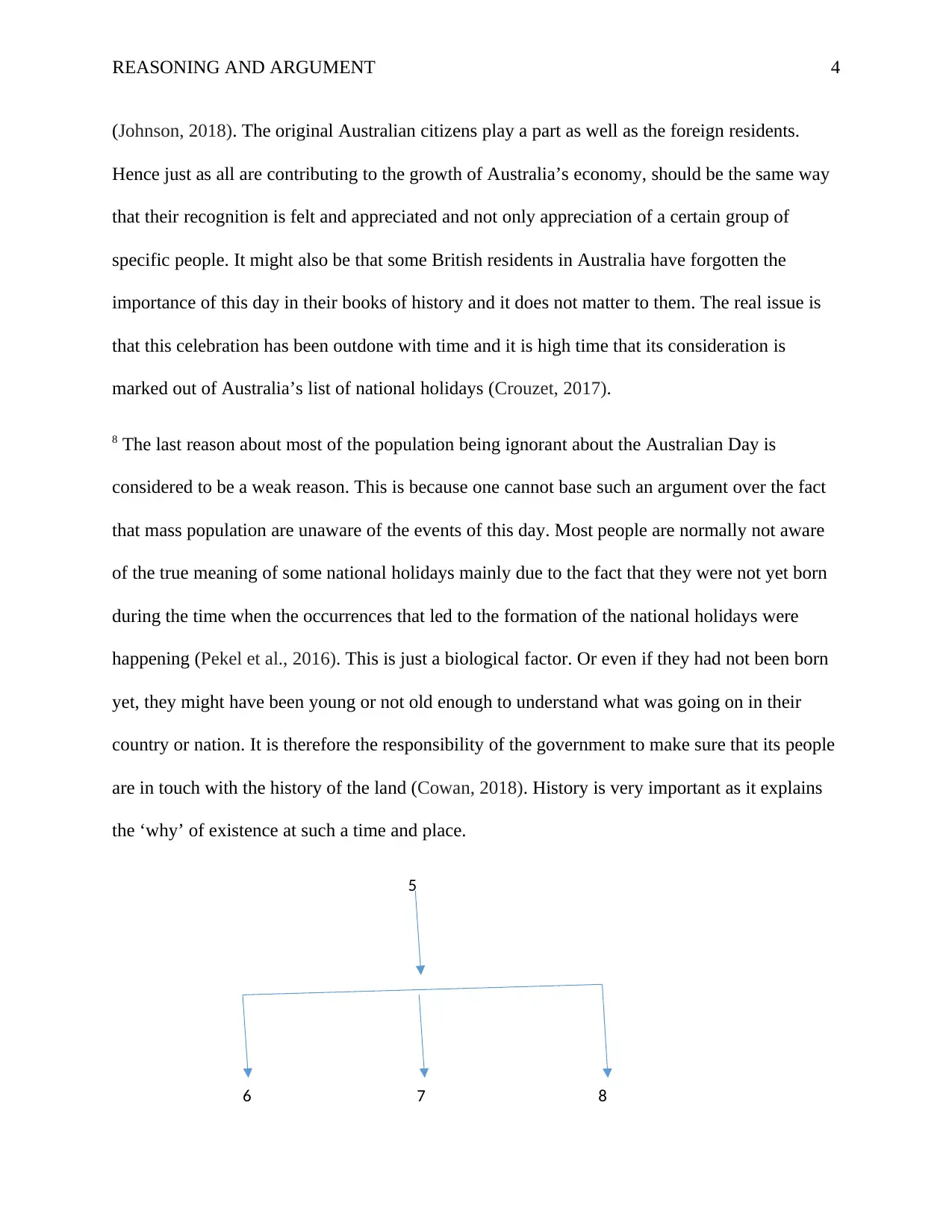
REASONING AND ARGUMENT 4
(Johnson, 2018). The original Australian citizens play a part as well as the foreign residents.
Hence just as all are contributing to the growth of Australia’s economy, should be the same way
that their recognition is felt and appreciated and not only appreciation of a certain group of
specific people. It might also be that some British residents in Australia have forgotten the
importance of this day in their books of history and it does not matter to them. The real issue is
that this celebration has been outdone with time and it is high time that its consideration is
marked out of Australia’s list of national holidays (Crouzet, 2017).
8 The last reason about most of the population being ignorant about the Australian Day is
considered to be a weak reason. This is because one cannot base such an argument over the fact
that mass population are unaware of the events of this day. Most people are normally not aware
of the true meaning of some national holidays mainly due to the fact that they were not yet born
during the time when the occurrences that led to the formation of the national holidays were
happening (Pekel et al., 2016). This is just a biological factor. Or even if they had not been born
yet, they might have been young or not old enough to understand what was going on in their
country or nation. It is therefore the responsibility of the government to make sure that its people
are in touch with the history of the land (Cowan, 2018). History is very important as it explains
the ‘why’ of existence at such a time and place.
5
6 7 8
(Johnson, 2018). The original Australian citizens play a part as well as the foreign residents.
Hence just as all are contributing to the growth of Australia’s economy, should be the same way
that their recognition is felt and appreciated and not only appreciation of a certain group of
specific people. It might also be that some British residents in Australia have forgotten the
importance of this day in their books of history and it does not matter to them. The real issue is
that this celebration has been outdone with time and it is high time that its consideration is
marked out of Australia’s list of national holidays (Crouzet, 2017).
8 The last reason about most of the population being ignorant about the Australian Day is
considered to be a weak reason. This is because one cannot base such an argument over the fact
that mass population are unaware of the events of this day. Most people are normally not aware
of the true meaning of some national holidays mainly due to the fact that they were not yet born
during the time when the occurrences that led to the formation of the national holidays were
happening (Pekel et al., 2016). This is just a biological factor. Or even if they had not been born
yet, they might have been young or not old enough to understand what was going on in their
country or nation. It is therefore the responsibility of the government to make sure that its people
are in touch with the history of the land (Cowan, 2018). History is very important as it explains
the ‘why’ of existence at such a time and place.
5
6 7 8
Paraphrase This Document
Need a fresh take? Get an instant paraphrase of this document with our AI Paraphraser
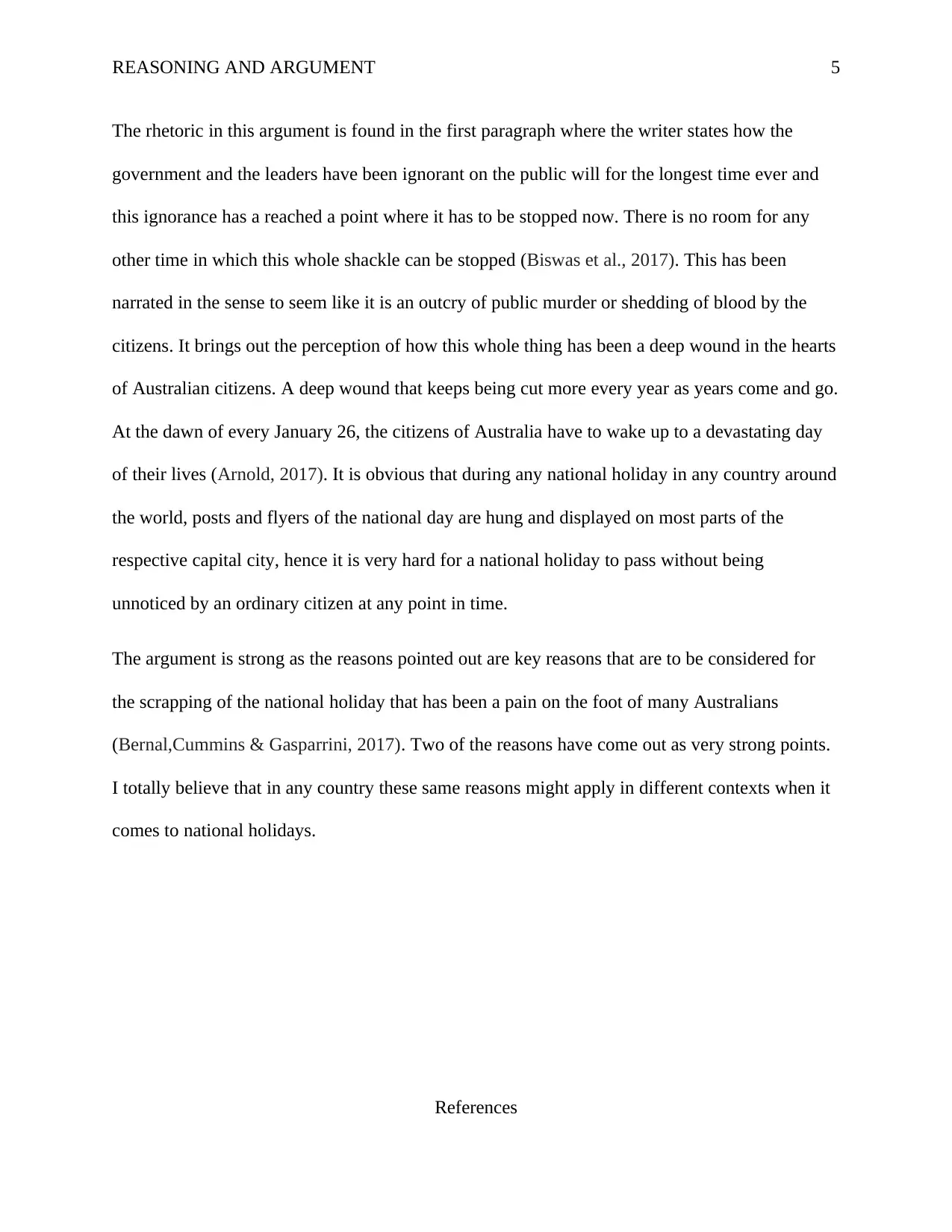
REASONING AND ARGUMENT 5
The rhetoric in this argument is found in the first paragraph where the writer states how the
government and the leaders have been ignorant on the public will for the longest time ever and
this ignorance has a reached a point where it has to be stopped now. There is no room for any
other time in which this whole shackle can be stopped (Biswas et al., 2017). This has been
narrated in the sense to seem like it is an outcry of public murder or shedding of blood by the
citizens. It brings out the perception of how this whole thing has been a deep wound in the hearts
of Australian citizens. A deep wound that keeps being cut more every year as years come and go.
At the dawn of every January 26, the citizens of Australia have to wake up to a devastating day
of their lives (Arnold, 2017). It is obvious that during any national holiday in any country around
the world, posts and flyers of the national day are hung and displayed on most parts of the
respective capital city, hence it is very hard for a national holiday to pass without being
unnoticed by an ordinary citizen at any point in time.
The argument is strong as the reasons pointed out are key reasons that are to be considered for
the scrapping of the national holiday that has been a pain on the foot of many Australians
(Bernal,Cummins & Gasparrini, 2017). Two of the reasons have come out as very strong points.
I totally believe that in any country these same reasons might apply in different contexts when it
comes to national holidays.
References
The rhetoric in this argument is found in the first paragraph where the writer states how the
government and the leaders have been ignorant on the public will for the longest time ever and
this ignorance has a reached a point where it has to be stopped now. There is no room for any
other time in which this whole shackle can be stopped (Biswas et al., 2017). This has been
narrated in the sense to seem like it is an outcry of public murder or shedding of blood by the
citizens. It brings out the perception of how this whole thing has been a deep wound in the hearts
of Australian citizens. A deep wound that keeps being cut more every year as years come and go.
At the dawn of every January 26, the citizens of Australia have to wake up to a devastating day
of their lives (Arnold, 2017). It is obvious that during any national holiday in any country around
the world, posts and flyers of the national day are hung and displayed on most parts of the
respective capital city, hence it is very hard for a national holiday to pass without being
unnoticed by an ordinary citizen at any point in time.
The argument is strong as the reasons pointed out are key reasons that are to be considered for
the scrapping of the national holiday that has been a pain on the foot of many Australians
(Bernal,Cummins & Gasparrini, 2017). Two of the reasons have come out as very strong points.
I totally believe that in any country these same reasons might apply in different contexts when it
comes to national holidays.
References
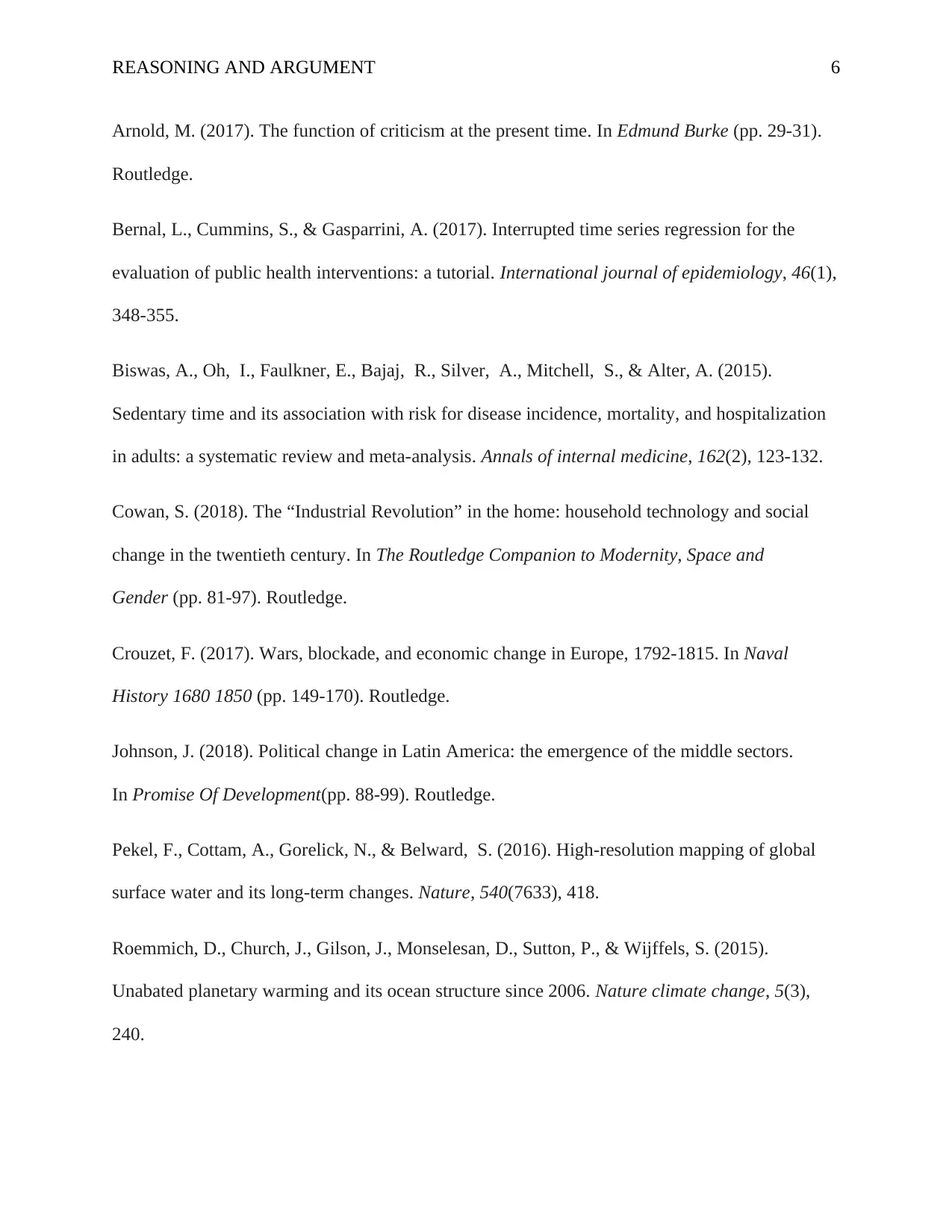
REASONING AND ARGUMENT 6
Arnold, M. (2017). The function of criticism at the present time. In Edmund Burke (pp. 29-31).
Routledge.
Bernal, L., Cummins, S., & Gasparrini, A. (2017). Interrupted time series regression for the
evaluation of public health interventions: a tutorial. International journal of epidemiology, 46(1),
348-355.
Biswas, A., Oh, I., Faulkner, E., Bajaj, R., Silver, A., Mitchell, S., & Alter, A. (2015).
Sedentary time and its association with risk for disease incidence, mortality, and hospitalization
in adults: a systematic review and meta-analysis. Annals of internal medicine, 162(2), 123-132.
Cowan, S. (2018). The “Industrial Revolution” in the home: household technology and social
change in the twentieth century. In The Routledge Companion to Modernity, Space and
Gender (pp. 81-97). Routledge.
Crouzet, F. (2017). Wars, blockade, and economic change in Europe, 1792-1815. In Naval
History 1680 1850 (pp. 149-170). Routledge.
Johnson, J. (2018). Political change in Latin America: the emergence of the middle sectors.
In Promise Of Development(pp. 88-99). Routledge.
Pekel, F., Cottam, A., Gorelick, N., & Belward, S. (2016). High-resolution mapping of global
surface water and its long-term changes. Nature, 540(7633), 418.
Roemmich, D., Church, J., Gilson, J., Monselesan, D., Sutton, P., & Wijffels, S. (2015).
Unabated planetary warming and its ocean structure since 2006. Nature climate change, 5(3),
240.
Arnold, M. (2017). The function of criticism at the present time. In Edmund Burke (pp. 29-31).
Routledge.
Bernal, L., Cummins, S., & Gasparrini, A. (2017). Interrupted time series regression for the
evaluation of public health interventions: a tutorial. International journal of epidemiology, 46(1),
348-355.
Biswas, A., Oh, I., Faulkner, E., Bajaj, R., Silver, A., Mitchell, S., & Alter, A. (2015).
Sedentary time and its association with risk for disease incidence, mortality, and hospitalization
in adults: a systematic review and meta-analysis. Annals of internal medicine, 162(2), 123-132.
Cowan, S. (2018). The “Industrial Revolution” in the home: household technology and social
change in the twentieth century. In The Routledge Companion to Modernity, Space and
Gender (pp. 81-97). Routledge.
Crouzet, F. (2017). Wars, blockade, and economic change in Europe, 1792-1815. In Naval
History 1680 1850 (pp. 149-170). Routledge.
Johnson, J. (2018). Political change in Latin America: the emergence of the middle sectors.
In Promise Of Development(pp. 88-99). Routledge.
Pekel, F., Cottam, A., Gorelick, N., & Belward, S. (2016). High-resolution mapping of global
surface water and its long-term changes. Nature, 540(7633), 418.
Roemmich, D., Church, J., Gilson, J., Monselesan, D., Sutton, P., & Wijffels, S. (2015).
Unabated planetary warming and its ocean structure since 2006. Nature climate change, 5(3),
240.
⊘ This is a preview!⊘
Do you want full access?
Subscribe today to unlock all pages.

Trusted by 1+ million students worldwide
1 out of 6
Your All-in-One AI-Powered Toolkit for Academic Success.
+13062052269
info@desklib.com
Available 24*7 on WhatsApp / Email
![[object Object]](/_next/static/media/star-bottom.7253800d.svg)
Unlock your academic potential
Copyright © 2020–2025 A2Z Services. All Rights Reserved. Developed and managed by ZUCOL.